Policing Practices: Enhancing Police Legitimacy in the Community
VerifiedAdded on 2023/06/07
|7
|2219
|61
Essay
AI Summary
This essay examines the crucial role of policing practices in fostering community legitimacy. It emphasizes the significance of effective communication, community policing strategies, and procedural justice in building trust and securing public confidence in law enforcement. The essay reviews literature highlighting how these elements contribute to a positive relationship between the police and the community, ultimately enhancing the police's ability to maintain law and order while ensuring the safety and well-being of civilians. It also touches upon how perceptions of police legitimacy are influenced by factors such as ethnic, cultural, and racial identities, which can create barriers to procedural justice. The conclusion underscores the importance of establishing proper communication processes, respecting community members, and creating a positive environment to enhance confidence in policing and promote procedural justice.

Running Head: Policing Practices
Policing Practices
Essay
System04104
8/31/2018
Policing Practices
Essay
System04104
8/31/2018
Paraphrase This Document
Need a fresh take? Get an instant paraphrase of this document with our AI Paraphraser
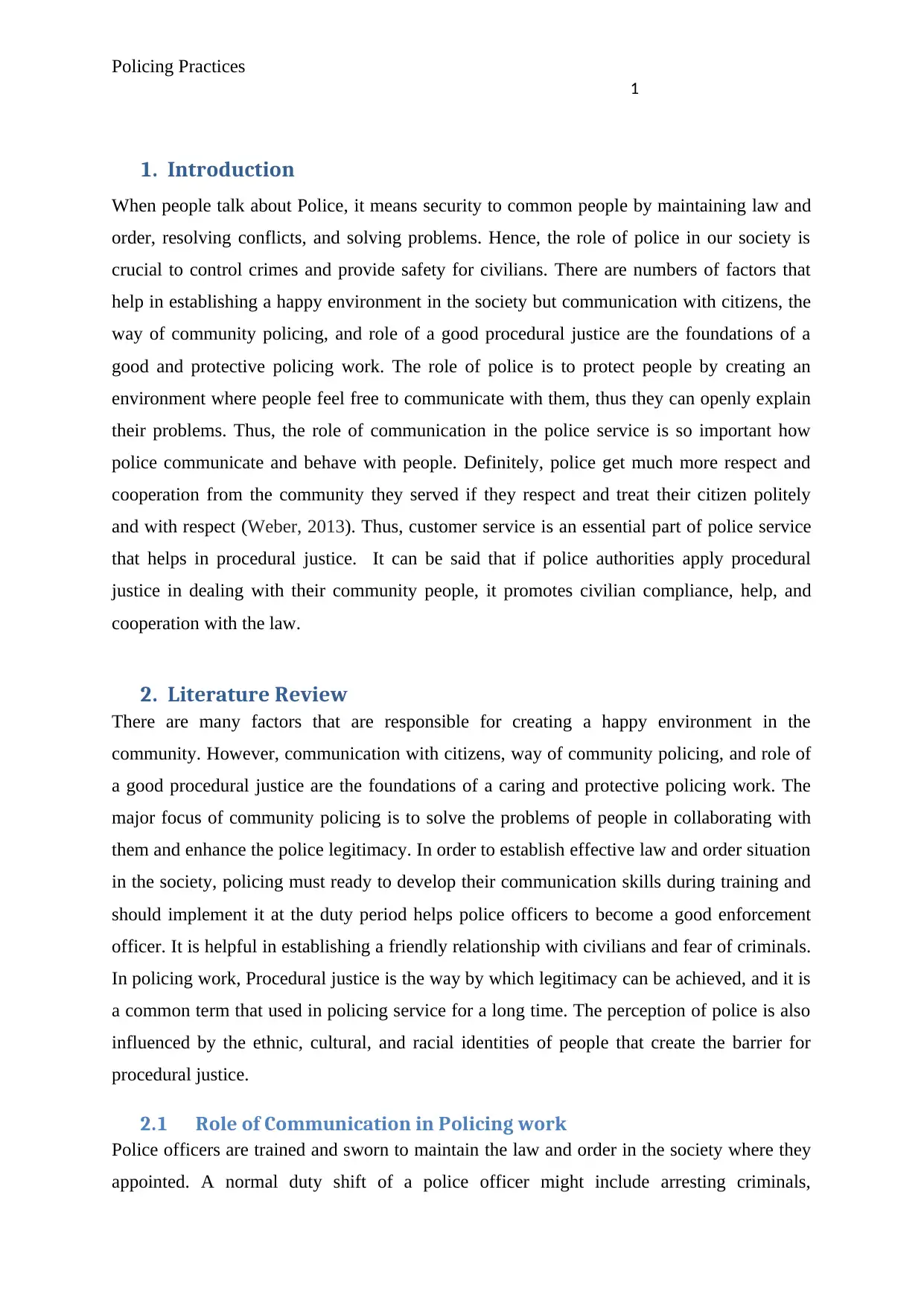
Policing Practices
1
1. Introduction
When people talk about Police, it means security to common people by maintaining law and
order, resolving conflicts, and solving problems. Hence, the role of police in our society is
crucial to control crimes and provide safety for civilians. There are numbers of factors that
help in establishing a happy environment in the society but communication with citizens, the
way of community policing, and role of a good procedural justice are the foundations of a
good and protective policing work. The role of police is to protect people by creating an
environment where people feel free to communicate with them, thus they can openly explain
their problems. Thus, the role of communication in the police service is so important how
police communicate and behave with people. Definitely, police get much more respect and
cooperation from the community they served if they respect and treat their citizen politely
and with respect (Weber, 2013). Thus, customer service is an essential part of police service
that helps in procedural justice. It can be said that if police authorities apply procedural
justice in dealing with their community people, it promotes civilian compliance, help, and
cooperation with the law.
2. Literature Review
There are many factors that are responsible for creating a happy environment in the
community. However, communication with citizens, way of community policing, and role of
a good procedural justice are the foundations of a caring and protective policing work. The
major focus of community policing is to solve the problems of people in collaborating with
them and enhance the police legitimacy. In order to establish effective law and order situation
in the society, policing must ready to develop their communication skills during training and
should implement it at the duty period helps police officers to become a good enforcement
officer. It is helpful in establishing a friendly relationship with civilians and fear of criminals.
In policing work, Procedural justice is the way by which legitimacy can be achieved, and it is
a common term that used in policing service for a long time. The perception of police is also
influenced by the ethnic, cultural, and racial identities of people that create the barrier for
procedural justice.
2.1 Role of Communication in Policing work
Police officers are trained and sworn to maintain the law and order in the society where they
appointed. A normal duty shift of a police officer might include arresting criminals,
1
1. Introduction
When people talk about Police, it means security to common people by maintaining law and
order, resolving conflicts, and solving problems. Hence, the role of police in our society is
crucial to control crimes and provide safety for civilians. There are numbers of factors that
help in establishing a happy environment in the society but communication with citizens, the
way of community policing, and role of a good procedural justice are the foundations of a
good and protective policing work. The role of police is to protect people by creating an
environment where people feel free to communicate with them, thus they can openly explain
their problems. Thus, the role of communication in the police service is so important how
police communicate and behave with people. Definitely, police get much more respect and
cooperation from the community they served if they respect and treat their citizen politely
and with respect (Weber, 2013). Thus, customer service is an essential part of police service
that helps in procedural justice. It can be said that if police authorities apply procedural
justice in dealing with their community people, it promotes civilian compliance, help, and
cooperation with the law.
2. Literature Review
There are many factors that are responsible for creating a happy environment in the
community. However, communication with citizens, way of community policing, and role of
a good procedural justice are the foundations of a caring and protective policing work. The
major focus of community policing is to solve the problems of people in collaborating with
them and enhance the police legitimacy. In order to establish effective law and order situation
in the society, policing must ready to develop their communication skills during training and
should implement it at the duty period helps police officers to become a good enforcement
officer. It is helpful in establishing a friendly relationship with civilians and fear of criminals.
In policing work, Procedural justice is the way by which legitimacy can be achieved, and it is
a common term that used in policing service for a long time. The perception of police is also
influenced by the ethnic, cultural, and racial identities of people that create the barrier for
procedural justice.
2.1 Role of Communication in Policing work
Police officers are trained and sworn to maintain the law and order in the society where they
appointed. A normal duty shift of a police officer might include arresting criminals,
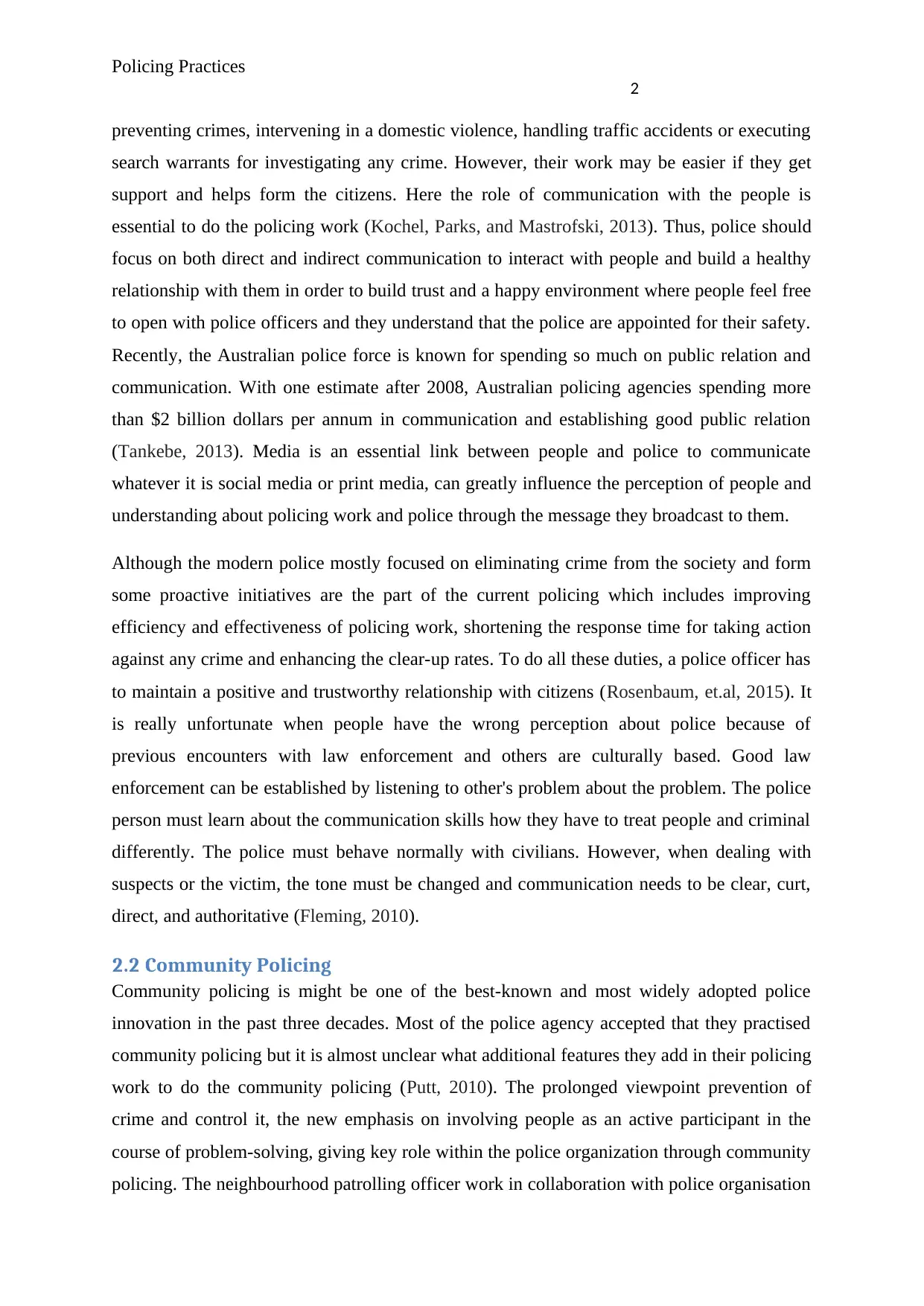
Policing Practices
2
preventing crimes, intervening in a domestic violence, handling traffic accidents or executing
search warrants for investigating any crime. However, their work may be easier if they get
support and helps form the citizens. Here the role of communication with the people is
essential to do the policing work (Kochel, Parks, and Mastrofski, 2013). Thus, police should
focus on both direct and indirect communication to interact with people and build a healthy
relationship with them in order to build trust and a happy environment where people feel free
to open with police officers and they understand that the police are appointed for their safety.
Recently, the Australian police force is known for spending so much on public relation and
communication. With one estimate after 2008, Australian policing agencies spending more
than $2 billion dollars per annum in communication and establishing good public relation
(Tankebe, 2013). Media is an essential link between people and police to communicate
whatever it is social media or print media, can greatly influence the perception of people and
understanding about policing work and police through the message they broadcast to them.
Although the modern police mostly focused on eliminating crime from the society and form
some proactive initiatives are the part of the current policing which includes improving
efficiency and effectiveness of policing work, shortening the response time for taking action
against any crime and enhancing the clear-up rates. To do all these duties, a police officer has
to maintain a positive and trustworthy relationship with citizens (Rosenbaum, et.al, 2015). It
is really unfortunate when people have the wrong perception about police because of
previous encounters with law enforcement and others are culturally based. Good law
enforcement can be established by listening to other's problem about the problem. The police
person must learn about the communication skills how they have to treat people and criminal
differently. The police must behave normally with civilians. However, when dealing with
suspects or the victim, the tone must be changed and communication needs to be clear, curt,
direct, and authoritative (Fleming, 2010).
2.2 Community Policing
Community policing is might be one of the best-known and most widely adopted police
innovation in the past three decades. Most of the police agency accepted that they practised
community policing but it is almost unclear what additional features they add in their policing
work to do the community policing (Putt, 2010). The prolonged viewpoint prevention of
crime and control it, the new emphasis on involving people as an active participant in the
course of problem-solving, giving key role within the police organization through community
policing. The neighbourhood patrolling officer work in collaboration with police organisation
2
preventing crimes, intervening in a domestic violence, handling traffic accidents or executing
search warrants for investigating any crime. However, their work may be easier if they get
support and helps form the citizens. Here the role of communication with the people is
essential to do the policing work (Kochel, Parks, and Mastrofski, 2013). Thus, police should
focus on both direct and indirect communication to interact with people and build a healthy
relationship with them in order to build trust and a happy environment where people feel free
to open with police officers and they understand that the police are appointed for their safety.
Recently, the Australian police force is known for spending so much on public relation and
communication. With one estimate after 2008, Australian policing agencies spending more
than $2 billion dollars per annum in communication and establishing good public relation
(Tankebe, 2013). Media is an essential link between people and police to communicate
whatever it is social media or print media, can greatly influence the perception of people and
understanding about policing work and police through the message they broadcast to them.
Although the modern police mostly focused on eliminating crime from the society and form
some proactive initiatives are the part of the current policing which includes improving
efficiency and effectiveness of policing work, shortening the response time for taking action
against any crime and enhancing the clear-up rates. To do all these duties, a police officer has
to maintain a positive and trustworthy relationship with citizens (Rosenbaum, et.al, 2015). It
is really unfortunate when people have the wrong perception about police because of
previous encounters with law enforcement and others are culturally based. Good law
enforcement can be established by listening to other's problem about the problem. The police
person must learn about the communication skills how they have to treat people and criminal
differently. The police must behave normally with civilians. However, when dealing with
suspects or the victim, the tone must be changed and communication needs to be clear, curt,
direct, and authoritative (Fleming, 2010).
2.2 Community Policing
Community policing is might be one of the best-known and most widely adopted police
innovation in the past three decades. Most of the police agency accepted that they practised
community policing but it is almost unclear what additional features they add in their policing
work to do the community policing (Putt, 2010). The prolonged viewpoint prevention of
crime and control it, the new emphasis on involving people as an active participant in the
course of problem-solving, giving key role within the police organization through community
policing. The neighbourhood patrolling officer work in collaboration with police organisation
⊘ This is a preview!⊘
Do you want full access?
Subscribe today to unlock all pages.

Trusted by 1+ million students worldwide
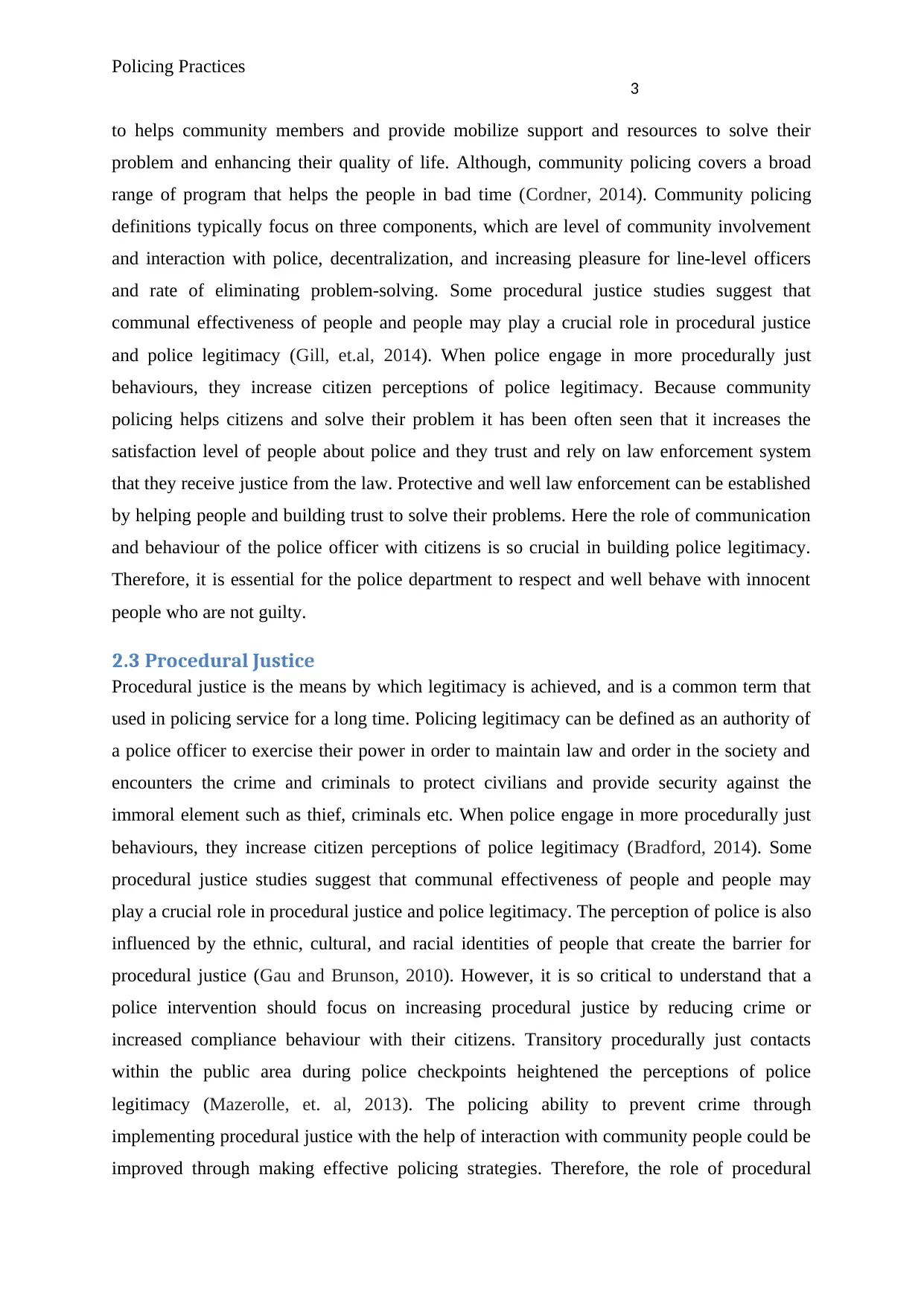
Policing Practices
3
to helps community members and provide mobilize support and resources to solve their
problem and enhancing their quality of life. Although, community policing covers a broad
range of program that helps the people in bad time (Cordner, 2014). Community policing
definitions typically focus on three components, which are level of community involvement
and interaction with police, decentralization, and increasing pleasure for line-level officers
and rate of eliminating problem-solving. Some procedural justice studies suggest that
communal effectiveness of people and people may play a crucial role in procedural justice
and police legitimacy (Gill, et.al, 2014). When police engage in more procedurally just
behaviours, they increase citizen perceptions of police legitimacy. Because community
policing helps citizens and solve their problem it has been often seen that it increases the
satisfaction level of people about police and they trust and rely on law enforcement system
that they receive justice from the law. Protective and well law enforcement can be established
by helping people and building trust to solve their problems. Here the role of communication
and behaviour of the police officer with citizens is so crucial in building police legitimacy.
Therefore, it is essential for the police department to respect and well behave with innocent
people who are not guilty.
2.3 Procedural Justice
Procedural justice is the means by which legitimacy is achieved, and is a common term that
used in policing service for a long time. Policing legitimacy can be defined as an authority of
a police officer to exercise their power in order to maintain law and order in the society and
encounters the crime and criminals to protect civilians and provide security against the
immoral element such as thief, criminals etc. When police engage in more procedurally just
behaviours, they increase citizen perceptions of police legitimacy (Bradford, 2014). Some
procedural justice studies suggest that communal effectiveness of people and people may
play a crucial role in procedural justice and police legitimacy. The perception of police is also
influenced by the ethnic, cultural, and racial identities of people that create the barrier for
procedural justice (Gau and Brunson, 2010). However, it is so critical to understand that a
police intervention should focus on increasing procedural justice by reducing crime or
increased compliance behaviour with their citizens. Transitory procedurally just contacts
within the public area during police checkpoints heightened the perceptions of police
legitimacy (Mazerolle, et. al, 2013). The policing ability to prevent crime through
implementing procedural justice with the help of interaction with community people could be
improved through making effective policing strategies. Therefore, the role of procedural
3
to helps community members and provide mobilize support and resources to solve their
problem and enhancing their quality of life. Although, community policing covers a broad
range of program that helps the people in bad time (Cordner, 2014). Community policing
definitions typically focus on three components, which are level of community involvement
and interaction with police, decentralization, and increasing pleasure for line-level officers
and rate of eliminating problem-solving. Some procedural justice studies suggest that
communal effectiveness of people and people may play a crucial role in procedural justice
and police legitimacy (Gill, et.al, 2014). When police engage in more procedurally just
behaviours, they increase citizen perceptions of police legitimacy. Because community
policing helps citizens and solve their problem it has been often seen that it increases the
satisfaction level of people about police and they trust and rely on law enforcement system
that they receive justice from the law. Protective and well law enforcement can be established
by helping people and building trust to solve their problems. Here the role of communication
and behaviour of the police officer with citizens is so crucial in building police legitimacy.
Therefore, it is essential for the police department to respect and well behave with innocent
people who are not guilty.
2.3 Procedural Justice
Procedural justice is the means by which legitimacy is achieved, and is a common term that
used in policing service for a long time. Policing legitimacy can be defined as an authority of
a police officer to exercise their power in order to maintain law and order in the society and
encounters the crime and criminals to protect civilians and provide security against the
immoral element such as thief, criminals etc. When police engage in more procedurally just
behaviours, they increase citizen perceptions of police legitimacy (Bradford, 2014). Some
procedural justice studies suggest that communal effectiveness of people and people may
play a crucial role in procedural justice and police legitimacy. The perception of police is also
influenced by the ethnic, cultural, and racial identities of people that create the barrier for
procedural justice (Gau and Brunson, 2010). However, it is so critical to understand that a
police intervention should focus on increasing procedural justice by reducing crime or
increased compliance behaviour with their citizens. Transitory procedurally just contacts
within the public area during police checkpoints heightened the perceptions of police
legitimacy (Mazerolle, et. al, 2013). The policing ability to prevent crime through
implementing procedural justice with the help of interaction with community people could be
improved through making effective policing strategies. Therefore, the role of procedural
Paraphrase This Document
Need a fresh take? Get an instant paraphrase of this document with our AI Paraphraser
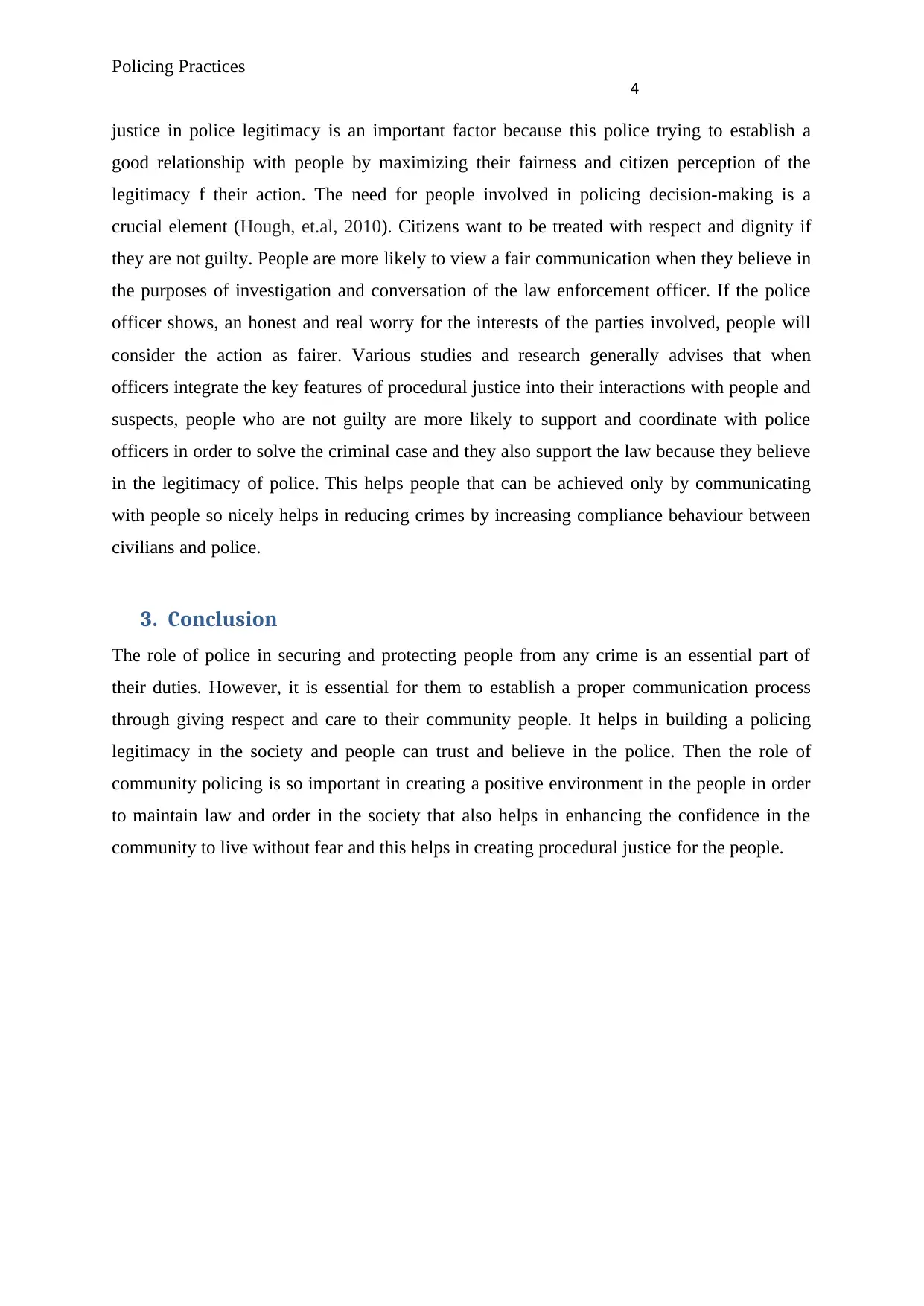
Policing Practices
4
justice in police legitimacy is an important factor because this police trying to establish a
good relationship with people by maximizing their fairness and citizen perception of the
legitimacy f their action. The need for people involved in policing decision-making is a
crucial element (Hough, et.al, 2010). Citizens want to be treated with respect and dignity if
they are not guilty. People are more likely to view a fair communication when they believe in
the purposes of investigation and conversation of the law enforcement officer. If the police
officer shows, an honest and real worry for the interests of the parties involved, people will
consider the action as fairer. Various studies and research generally advises that when
officers integrate the key features of procedural justice into their interactions with people and
suspects, people who are not guilty are more likely to support and coordinate with police
officers in order to solve the criminal case and they also support the law because they believe
in the legitimacy of police. This helps people that can be achieved only by communicating
with people so nicely helps in reducing crimes by increasing compliance behaviour between
civilians and police.
3. Conclusion
The role of police in securing and protecting people from any crime is an essential part of
their duties. However, it is essential for them to establish a proper communication process
through giving respect and care to their community people. It helps in building a policing
legitimacy in the society and people can trust and believe in the police. Then the role of
community policing is so important in creating a positive environment in the people in order
to maintain law and order in the society that also helps in enhancing the confidence in the
community to live without fear and this helps in creating procedural justice for the people.
4
justice in police legitimacy is an important factor because this police trying to establish a
good relationship with people by maximizing their fairness and citizen perception of the
legitimacy f their action. The need for people involved in policing decision-making is a
crucial element (Hough, et.al, 2010). Citizens want to be treated with respect and dignity if
they are not guilty. People are more likely to view a fair communication when they believe in
the purposes of investigation and conversation of the law enforcement officer. If the police
officer shows, an honest and real worry for the interests of the parties involved, people will
consider the action as fairer. Various studies and research generally advises that when
officers integrate the key features of procedural justice into their interactions with people and
suspects, people who are not guilty are more likely to support and coordinate with police
officers in order to solve the criminal case and they also support the law because they believe
in the legitimacy of police. This helps people that can be achieved only by communicating
with people so nicely helps in reducing crimes by increasing compliance behaviour between
civilians and police.
3. Conclusion
The role of police in securing and protecting people from any crime is an essential part of
their duties. However, it is essential for them to establish a proper communication process
through giving respect and care to their community people. It helps in building a policing
legitimacy in the society and people can trust and believe in the police. Then the role of
community policing is so important in creating a positive environment in the people in order
to maintain law and order in the society that also helps in enhancing the confidence in the
community to live without fear and this helps in creating procedural justice for the people.
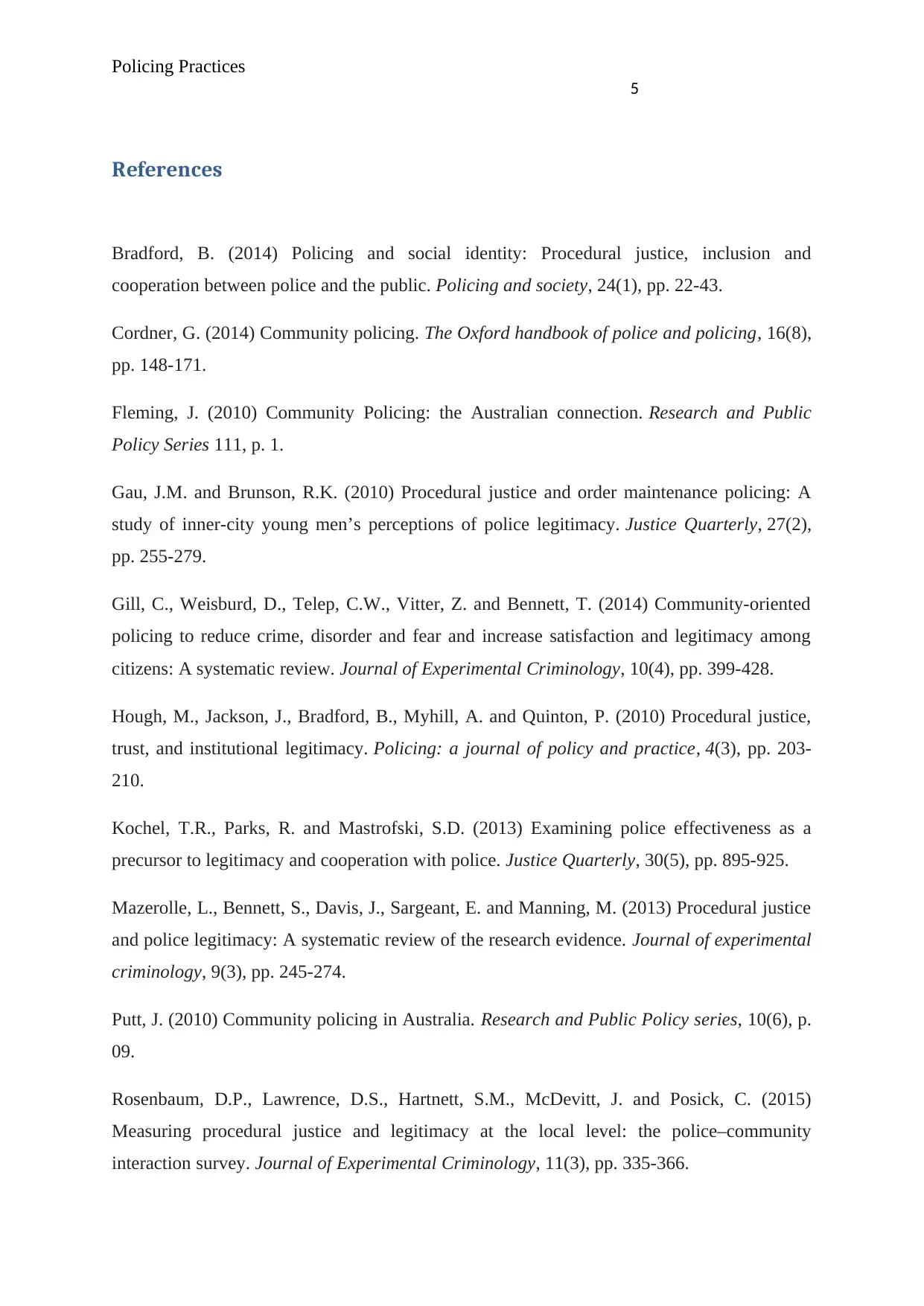
Policing Practices
5
References
Bradford, B. (2014) Policing and social identity: Procedural justice, inclusion and
cooperation between police and the public. Policing and society, 24(1), pp. 22-43.
Cordner, G. (2014) Community policing. The Oxford handbook of police and policing, 16(8),
pp. 148-171.
Fleming, J. (2010) Community Policing: the Australian connection. Research and Public
Policy Series 111, p. 1.
Gau, J.M. and Brunson, R.K. (2010) Procedural justice and order maintenance policing: A
study of inner‐city young men’s perceptions of police legitimacy. Justice Quarterly, 27(2),
pp. 255-279.
Gill, C., Weisburd, D., Telep, C.W., Vitter, Z. and Bennett, T. (2014) Community-oriented
policing to reduce crime, disorder and fear and increase satisfaction and legitimacy among
citizens: A systematic review. Journal of Experimental Criminology, 10(4), pp. 399-428.
Hough, M., Jackson, J., Bradford, B., Myhill, A. and Quinton, P. (2010) Procedural justice,
trust, and institutional legitimacy. Policing: a journal of policy and practice, 4(3), pp. 203-
210.
Kochel, T.R., Parks, R. and Mastrofski, S.D. (2013) Examining police effectiveness as a
precursor to legitimacy and cooperation with police. Justice Quarterly, 30(5), pp. 895-925.
Mazerolle, L., Bennett, S., Davis, J., Sargeant, E. and Manning, M. (2013) Procedural justice
and police legitimacy: A systematic review of the research evidence. Journal of experimental
criminology, 9(3), pp. 245-274.
Putt, J. (2010) Community policing in Australia. Research and Public Policy series, 10(6), p.
09.
Rosenbaum, D.P., Lawrence, D.S., Hartnett, S.M., McDevitt, J. and Posick, C. (2015)
Measuring procedural justice and legitimacy at the local level: the police–community
interaction survey. Journal of Experimental Criminology, 11(3), pp. 335-366.
5
References
Bradford, B. (2014) Policing and social identity: Procedural justice, inclusion and
cooperation between police and the public. Policing and society, 24(1), pp. 22-43.
Cordner, G. (2014) Community policing. The Oxford handbook of police and policing, 16(8),
pp. 148-171.
Fleming, J. (2010) Community Policing: the Australian connection. Research and Public
Policy Series 111, p. 1.
Gau, J.M. and Brunson, R.K. (2010) Procedural justice and order maintenance policing: A
study of inner‐city young men’s perceptions of police legitimacy. Justice Quarterly, 27(2),
pp. 255-279.
Gill, C., Weisburd, D., Telep, C.W., Vitter, Z. and Bennett, T. (2014) Community-oriented
policing to reduce crime, disorder and fear and increase satisfaction and legitimacy among
citizens: A systematic review. Journal of Experimental Criminology, 10(4), pp. 399-428.
Hough, M., Jackson, J., Bradford, B., Myhill, A. and Quinton, P. (2010) Procedural justice,
trust, and institutional legitimacy. Policing: a journal of policy and practice, 4(3), pp. 203-
210.
Kochel, T.R., Parks, R. and Mastrofski, S.D. (2013) Examining police effectiveness as a
precursor to legitimacy and cooperation with police. Justice Quarterly, 30(5), pp. 895-925.
Mazerolle, L., Bennett, S., Davis, J., Sargeant, E. and Manning, M. (2013) Procedural justice
and police legitimacy: A systematic review of the research evidence. Journal of experimental
criminology, 9(3), pp. 245-274.
Putt, J. (2010) Community policing in Australia. Research and Public Policy series, 10(6), p.
09.
Rosenbaum, D.P., Lawrence, D.S., Hartnett, S.M., McDevitt, J. and Posick, C. (2015)
Measuring procedural justice and legitimacy at the local level: the police–community
interaction survey. Journal of Experimental Criminology, 11(3), pp. 335-366.
⊘ This is a preview!⊘
Do you want full access?
Subscribe today to unlock all pages.

Trusted by 1+ million students worldwide

Policing Practices
6
Tankebe, J. (2013) Viewing things differently: The dimensions of public perceptions of
police legitimacy. Criminology, 51(1), pp. 103-135.
Weber, L. (2013) Policing non-citizens. New York, USA: Rutledge.
6
Tankebe, J. (2013) Viewing things differently: The dimensions of public perceptions of
police legitimacy. Criminology, 51(1), pp. 103-135.
Weber, L. (2013) Policing non-citizens. New York, USA: Rutledge.
1 out of 7
Related Documents
Your All-in-One AI-Powered Toolkit for Academic Success.
+13062052269
info@desklib.com
Available 24*7 on WhatsApp / Email
![[object Object]](/_next/static/media/star-bottom.7253800d.svg)
Unlock your academic potential
Copyright © 2020–2026 A2Z Services. All Rights Reserved. Developed and managed by ZUCOL.





